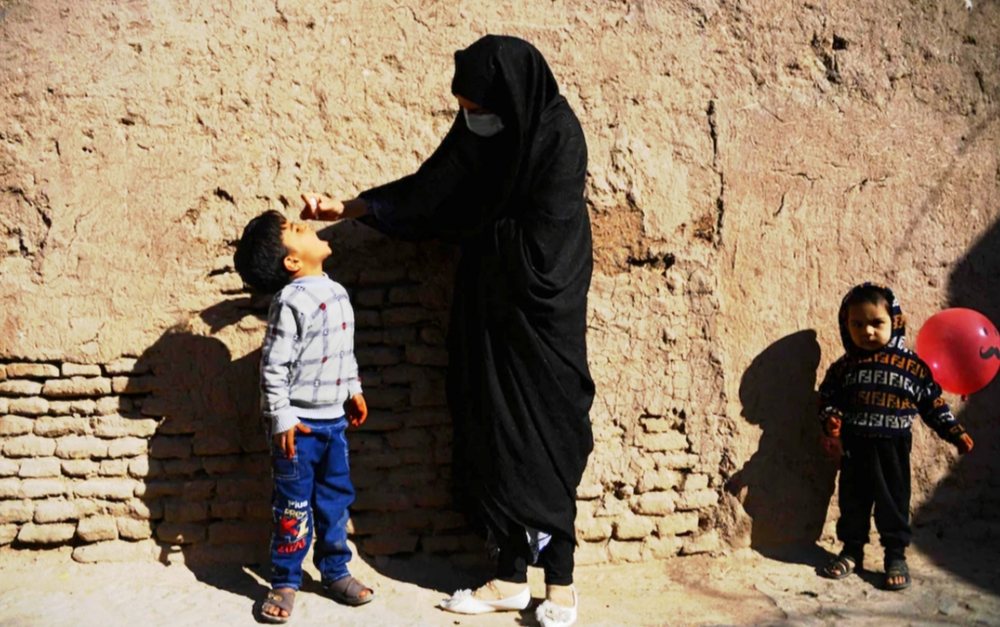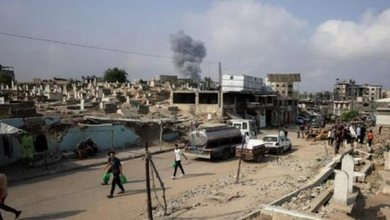
Four years after the Taliban returned to power, unprecedented poverty is causing mass hunger and a mental health crisis across Afghanistan.
Out of sheer desperation, she sold her two-year-old son in exchange for four hundred square meters of land. Like many other women in Taliban-ruled Afghanistan, she traded her child so that others could survive – the harsh reality of famine in the country.
“I have seven young children and they are all hungry,” she tells The Telegraph, clasping her hands together tightly. “We gave up our son so that others could survive.”
The sale took place five months ago in her remote village in the western province of Herat. She remembers that day over and over again – the emotional weight is still very fresh. Now, she lives with the pain and the knowledge that the decision was a painful act of pragmatism, dictated by poverty.
Homeyra's husband, a former soldier in the Afghan army, was disabled during the war that preceded the Taliban's takeover. Unable to work or provide for himself, he could only watch as his family starved.
The offer to buy their two-year-old son came from a wealthy landowner in the village, married several times but childless. In exchange for their child, he offered 400 square meters of farmland – probably enough to grow wheat and keep his other six children alive.
“I cry every night for my son,” says Homeyra. “I’m worried about him, but also happy that others can have food. We want to grow wheat or something else that we can sell and buy food – many people in our village are hungry.”
The little boy, still too young to understand what had happened, disappeared into the life of another family, while his mother's arms remain forever empty.
Her story is a reflection of the human cost of Afghanistan's economic collapse - a crisis that has turned the country into one of the world's greatest humanitarian disasters.
Since the Taliban's return in August 2021, international sanctions, asset freezes, and cuts to humanitarian aid have created a storm of suffering, hitting families like Homeyra's hardest.
Despite this, the Taliban's white flags fly proudly across Afghan cities as the group celebrates the fourth anniversary of its return to power following the withdrawal of US and NATO forces.
On Friday, women were banned from attending celebrations marking the anniversary of the Taliban's seizure of power. About 10,000 men gathered in Kabul to watch defense ministry helicopters drop flowers on the crowds.
Three of the six places where the flowers were thrown have now been off-limits to women since November 2022, when they were banned from entering the parks. The Taliban's treatment of women, including the arrest of schoolgirls who do not wear the hijab "properly", has been strongly condemned by the UN.
Beyond the Taliban's "flower shower" propaganda, the reality in people's homes is much darker.
The latest wave of suicides in Khost province clearly shows how economic despair is causing a deep mental health crisis.
Three young people, including a poor married couple, committed suicide on Wednesday, bringing the number of suicides in three days to seven. Young people are particularly vulnerable to a lack of opportunities and bleak prospects for the future.
Financial stress, social restrictions, and a lack of mental health services have become a perfect storm for psychological crisis.
The government's promises of stability brought nothing but deeper poverty. The ban on women from working removed half the workforce from an economy already devastated by decades of war.
The forced return of hundreds of thousands of Afghan refugees from Iran and Pakistan has created new challenges for rulers, adding millions of mouths to feed in a country already suffering from hunger.
According to a senior Taliban official who spoke to The Telegraph, this situation has caused internal divisions within the clerical regime, fueling fears of a new civil war.
“You can’t govern a hungry nation,” he says. “The lack of management and money to take care of the people has deepened the political conflict between Kabul and the center of power in Kandahar.”
“Some ministers are angry with the supreme mullah and his extreme rules, but they cannot speak out because they are required to appear united before the public,” he adds, referring to Hibatullah Akhundzada, the supreme leader who has never been seen in public.
"If he continues like this, many will rise up against him and there will be a new civil war."
Returnees from Iran and Pakistan, expelled against their will, arrive with nothing but the clothes they are wearing, and join the camps of displaced people that have become cities of despair.
They used to send money home to help their families, but now they compete for the same few jobs and insufficient food.
Some have already signed deals with smugglers to return illegally to Iran to work. Others become part of an ever-growing crowd of hungry people.
“Even if they deport me 100 more times, I will come back,” says Shah Jahan, a young man deported from Iran last month – for the fourth time in two years.
"There is no work for me in Afghanistan and I have to feed the children. No matter how badly the Iranians treat me, I will go back to send money home."
International recognition remains elusive, keeping Afghanistan isolated from global financial systems and humanitarian aid.
The streets and markets are filled with children under the age of 10, their emaciated bodies showing the effects of hunger.
They beg from passersby, running between stalls with vacant eyes and outstretched hands. Some collapse from weakness on the dusty sidewalks as vendors pass them by, unable to share even a scrap of food for fear that their families are also starving.
Although Afghanistan is now safer from terrorist attacks, crime has exploded over the past four years. Thefts, robberies and violence have become commonplace as desperate families turn to crime to survive.
The Taliban's public floggings and executions, held in stadiums before forced crowds, have done little to stop hunger-fueled crime.
"Two men on a motorbike stopped me and forced me to get off my motorbike. I tried to resist, but they shot me in the leg and took my motorbike," says Firouzi, who worked as a food delivery man until three months ago.
When he went to the nearest police station in Kabul a few days later, the Taliban blamed him and promised to find the motorbike, but the loss was devastating for the 27-year-old with a degree in management and a one-year-old son.
"From that day on, I borrowed money from everyone I knew, but the baby has a lot of needs, and I started selling household items. Yesterday I sold the carpet to buy formula for him," he tells The Telegraph.
The motorbike was his livelihood – the only way to earn a living in a city where unemployment is tantamount to a death sentence.
Now, with an injured leg and no means of transportation, Firouzi joins the ranks of Afghanistan's invisible unemployed - men with university degrees forced to sell family assets to feed their children.
“Everyone is hungry and few can afford three meals a day. There is no work, no money, no nothing – and prices are rising every day,” he says. “Little children are begging for money and food everywhere.”
'Poverty rates will not improve'
The figures paint a picture of systematic hunger.
According to the International Rescue Committee, 28.8 million people are currently in urgent need of assistance.
More than 90% of the population lives in poverty, while 40% face acute food insecurity.
But statistics cannot describe the moral devastation that hunger brings.
At the Herat hospital, where Homeyra brought her daughter for treatment she could not afford, similar stories are heard in every ward.
A hospital doctor says families bring in sick children, most of whom are malnourished and haven't eaten a full meal for days.
“The poverty rate is unprecedented and will not improve,” he says.
He adds: “People’s main concern is finding food, and when you’re hungry, health care becomes secondary. As a result, more sick children come in every day.”
Mothers arrive carrying hungry children in their arms, their bodies exhausted because they have given every morsel for their children.
Doctors work without pay, with salaries unpaid for months, treating patients who cannot pay for medicines that are barely available in pharmacies.
“Life has never been in our favor,” says Homeyra. “My heart breaks for my children – I don’t know which one to cry for first.”
Source: The Telegraph






















